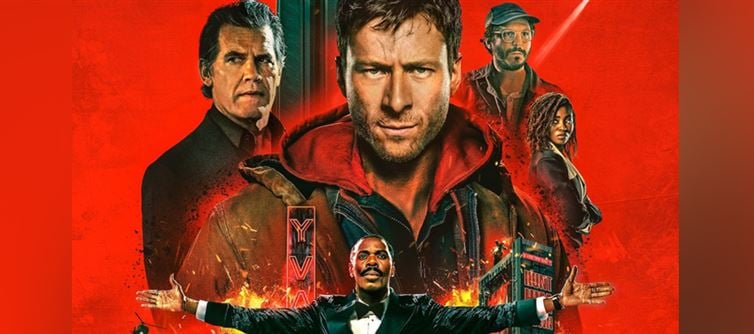
Story
Edgar Wright’s The Running Man reimagines stephen King’s 1982 novel with a modern sting, leaning hard into the dystopian anxieties of our hyper-surveilled age. The film opens on a sobering note: Ben Richards (Glen Powell), cradling his feverish infant, is fired from his job by the all-powerful Network — a corporation that monopolizes nearly every sector of Co-Op City and ensures that a blacklist is a near-certain death sentence for the poor. As Ben’s family sinks deeper into crisis, even basic medicine becomes unattainable, exposing the brutal class divide that fuels the film’s world.
Cornered and desperate, Ben enters Free-Vee’s sadistic audition system, where impoverished contestants subject themselves to televised humiliation for a few “New Dollars.” The crown jewel of these exploitative programs is The Running Man, a deadly game show with a flawless fatality rate. producer Dan Killian (Josh Brolin), all smile and poison, convinces Ben that he could be the first to beat the Hunters — elite mercenaries trained to kill contestants for the public’s ravenous entertainment.
Wright’s adaptation leans into spectacle, adrenaline, and satire. While the story barrels forward with exhilarating intensity, the world-building occasionally feels rushed, especially in the first act, which could have benefited from deeper exploration of Co-Op City’s dystopian infrastructure and Ben’s workplace conflict. Still, the central premise remains irresistible, and once the game begins, the film grips tight and rarely lets up.
Performances
Glen Powell anchors the film with easy charisma and emotional weight, blending vulnerability, grit, and comedic timing with remarkable fluidity. His transformation from desperate husband to public symbol is effective — even if the script leaves some character beats undercooked — and he proves once again that he’s among the most compelling leading men of his generation.
Colman Domingo steals scenes as flamboyant host bobby T., infusing the role with electric showmanship. josh Brolin delivers chilling confidence as Killian, embodying the manipulative corporate overlord with unnerving ease. Michael Cera, slyly understated as a revolutionary insider, adds welcome texture to the cast.
The ensemble is uniformly excellent, each actor synchronizing with Wright’s rhythmic, high-energy tone. Even when the narrative falters, the cast ensures the film never loses its spark.
Technicalities
Wright’s direction is an explosive cocktail of kinetic editing, visual wit, and rhythmic staging — the signature style that has defined his career. The Running Man is arguably his largest canvas yet, packed with dynamically shot chases, neon-soaked arenas, and inventive action beats that play like dystopian game-show fever dreams.
The film pulses with momentum, from whip-fast transitions to punchy needle drops to choreography that borders on musicality. While some of the CGI-heavy sequences veer slightly below the polish of Wright’s practical-action strengths, the overall craftsmanship is vibrant and immersive.
The film’s satirical edge permeates the design: the glossy, grotesque Free-Vee aesthetic; the aggressively overstimulating graphics; the surveillance-drunk public who gleefully track Ben’s every move. It’s exaggerated, yet alarmingly recognizable.
Analysis
Wright’s The Running Man is a paradox: visually electric yet thematically restrained. The film’s social commentary — class warfare, media spectacle, corporate monopoly — is present but rarely probed with the depth it hints at. A stronger, more fleshed-out first act could have elevated Ben’s journey and the world’s sociopolitical landscape.
But Wright compensates with relentless entertainment. The film is loud, bold, funny, and wildly engaging, a reminder of how thrilling a big-screen action satire can be when guided by a stylistic auteur. Even when the script skims the surface, the delivery is so propulsive that the experience remains irresistibly fun.
What Works
• Glen Powell’s charismatic, emotionally grounded performance
• Edgar Wright’s signature kinetic style and rhythmic editing
• Colman Domingo and josh Brolin are delivering standout supporting turns
• Satirical, visually striking game-show world
• Action sequences that blend humor, tension, and spectacle
What Doesn’t
• Underdeveloped first act and rushed world-building
• Thematic exploration feels incomplete
• Some CGI sequences lack polish
• Character arcs occasionally feel flatter than intended




 click and follow Indiaherald WhatsApp channel
click and follow Indiaherald WhatsApp channel